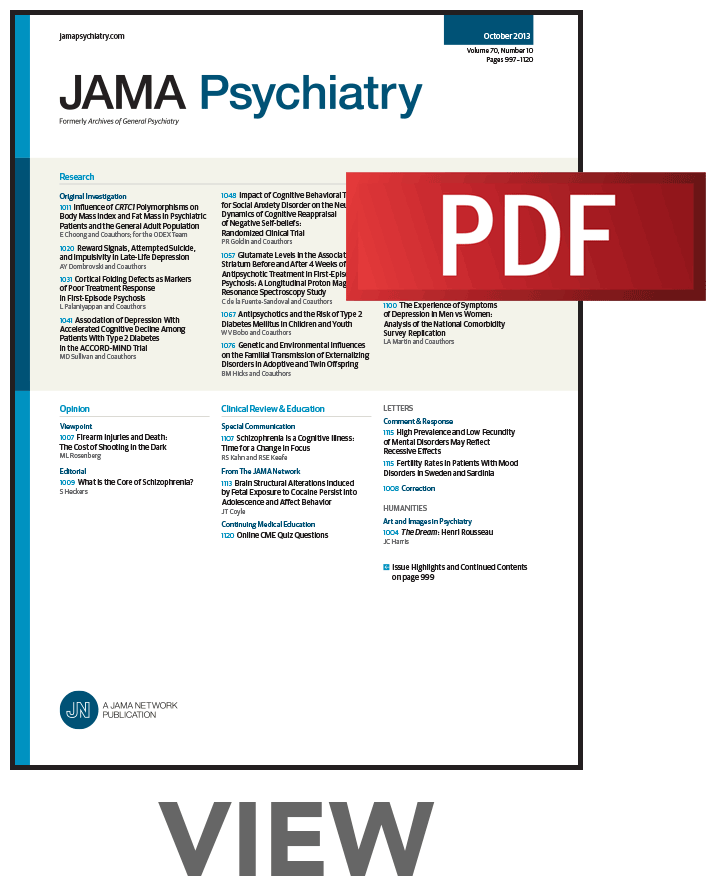Expectancy Effects, Failure of Blinding Integrity, and Placebo Response in Trials of Treatments for Psychiatric Disorders
IF 22.5
1区 医学
Q1 PSYCHIATRY
引用次数: 0
Abstract
ImportanceExpectancy effects are significant confounding factors in psychiatric randomized clinical trials (RCTs), potentially affecting the interpretation of study results. This narrative review is the first, to our knowledge, to explore the relationship between expectancy effects, compromised blinding integrity, and the effects of active treatment/placebo in psychiatric RCTs. Additionally, we present statistical and experimental approaches that may help mitigate the confounding impact of expectancy effects. The review concludes with recommendations to enhance the reliability of RCTs in psychiatry.ObservationsThe placebo response comprises both specific and nonspecific elements, with expectation being a key specific component. Evidence from experimental and clinical studies suggests that expectancy can influence treatment responses in RCTs. Blinding integrity may be compromised by perceived treatment efficacy and adverse effects, introducing bias into outcome assessments. Treatment expectations can lead to unblinding during RCTs, and meta-analytic data from studies in the fields of psychedelics and anxiety disorders indicate that this can influence effect sizes. Therefore, controlling for expectancy effects is essential when interpreting RCT results. Novel statistical methods, though still in need of further validation, offer strategies to address this issue. Another approach may involve experimental medicine models, which aim to develop objective improvement markers (readouts) less affected by expectancy effects.Conclusions and RelevanceExpectancy effects represent a significant confound in psychiatric RCTs. We recommend collecting data on treatment expectations alongside monitoring blinding integrity to more accurately interpret study results. Additionally, developing objective readouts that are less confounded by expectancy effects offers another promising avenue for mitigating these confounding influences in psychiatric RCTs.精神疾病治疗试验中的预期效应、盲法完整性失败和安慰剂反应
重要性期望效应是精神病学随机临床试验(rct)中重要的混杂因素,可能影响研究结果的解释。据我们所知,这篇叙述性综述是第一次探讨预期效应、妥协的盲法完整性和精神病学随机对照试验中积极治疗/安慰剂效应之间的关系。此外,我们提出了统计和实验方法,可能有助于减轻期望效应的混淆影响。这篇综述最后提出了提高精神病学随机对照试验可靠性的建议。安慰剂反应包括特异性和非特异性两个部分,其中预期是一个关键的特异性组成部分。来自实验和临床研究的证据表明,期望可以影响随机对照试验中的治疗反应。盲法的完整性可能会受到治疗疗效和不良反应的影响,从而在结果评估中引入偏差。在随机对照试验中,治疗预期可能导致解盲,来自致幻剂和焦虑症领域研究的荟萃分析数据表明,这可能会影响效应大小。因此,在解释RCT结果时,控制预期效应是必不可少的。新的统计方法,虽然仍需要进一步验证,提供了解决这一问题的策略。另一种方法可能涉及实验医学模型,其目的是开发较少受预期效应影响的客观改进标记(读数)。结论和相关预期效应在精神病学随机对照试验中表现出显著的混淆。我们建议收集治疗预期的数据,同时监测盲法的完整性,以更准确地解释研究结果。此外,开发较少受期望影响的客观读数为减轻精神病学随机对照试验中的这些混杂影响提供了另一种有希望的途径。
本文章由计算机程序翻译,如有差异,请以英文原文为准。
求助全文
约1分钟内获得全文
求助全文
来源期刊

JAMA Psychiatry
PSYCHIATRY-
CiteScore
30.60
自引率
1.90%
发文量
233
期刊介绍:
JAMA Psychiatry is a global, peer-reviewed journal catering to clinicians, scholars, and research scientists in psychiatry, mental health, behavioral science, and related fields. The Archives of Neurology & Psychiatry originated in 1919, splitting into two journals in 1959: Archives of Neurology and Archives of General Psychiatry. In 2013, these evolved into JAMA Neurology and JAMA Psychiatry, respectively. JAMA Psychiatry is affiliated with the JAMA Network, a group of peer-reviewed medical and specialty publications.
 求助内容:
求助内容: 应助结果提醒方式:
应助结果提醒方式:


